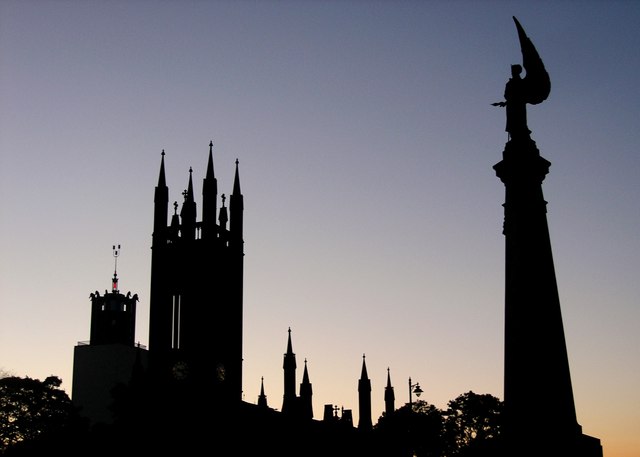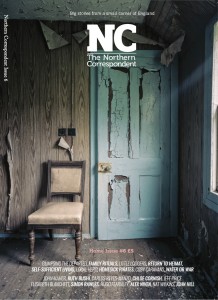The greatest infrastructure project we need to build in the Northern Powerhouse? Re-enchantment with who we are, where we live and where we’re going, urges Rachel Armstrong
It has been billed as a once-in-a-generation chance to bring much needed investment, jobs and economic growth to our region, building brighter futures for our cities and towns.
And yet, none of the discussions so far about the Northern Powerhouse have convinced me that the north east is ready to grasp this opportunity with any original thinking.
My inbox is packed with invitations to events that address the “future of our cities”. But as I scan these emails I notice that most use the same language and ideas around businesses working in partnership with local government to meet central directives. The agendas for these conferences and events focus on the invention of new technologies to update urban infrastructures such as transport, information services, telecommunications, energy and utilities. They aim for built environments where emissions are reduced, spaces are greened, energy is renewable, buildings are efficient, everything is smart, data flourishes and architecture mimics nature.
But, what exactly will this mean for the people who live in those cities and towns? Will our north east conurbations be prosperous, or downbeat? Will they treat everyone fairly? Will they be happy places to live, or increasingly austere? What freedoms, rights, responsibilities and experiences will we enjoy? And who exactly will benefit from these built environments, their products and services?

Photo by Andrew Tryon under Creative Commons licence
In economic terms, the Northern Powerhouse might make it easier for our city regions to compete on a global stage. We may find strong regional leaders who will ensure the north east receives its share of the investment and resources, that our cities don’t become subservient satellites to Manchester. And we might figure out how to upskill our workforce to deliver whatever infrastructure and construction projects come our way.
These are important issues to discuss… but only if we’ve first discussed what kind of cities and towns we want in the north east in 20 years time.
Sadly, everyday voices are absent from these conversations. The Northern Powerhouse initiative offers us the chance to bypass the usual homogenous approach to cities, and instead give communities in the north east the opportunity to think creatively about how their values might be expressed in the built environments that surround them
I’m not talking about artists in lofts, tidy walkways along rivers, or inviting more businesses to serve their own interests. We urgently need radical experiments in urban living that ask the important question – how do we want to live?
For example, existing future city agendas promote an unabashed global corporatism. That’s fine if you are one of the “haves” who has something to protect, save, or reduce. But what about the “have-nots”, the poor and dispossessed who have nothing? Could our aspirations of the Northern Powerhouse and the built environment not extend to reducing social inequality too? And if so, are we ready to consider ideas about shared ownership of land and utilities so that no-one goes without basic levels of shelter or comfort.
Of course “carbon counting” and ‘building efficiency’ are important in the better design of buildings, or being careful with scant resources – but they are secondary to what happens to people. We must not confuse proposed solutions and infrastructure projects as substitutes for the visions they serve. They are a means to an end – not the end in itself. The greatest infrastructure we need to build in the Northern Powerhouse? Re-enchantment with who we are, where we live and where we’re going.
Rachel Armstrong is Professor of Experimental Architecture at Newcastle University. You can follow her on Twitter.
“Northern Powerhouse or Northern Powercut?”, a debate organised by the Royal Institution of Chartered Surveyors, Royal Institute of British Architects, Royal Town Planning Institute, Landscape Institute and the Institution of Civil Engineers is being held at Northumbria University on Tuesday 26th January at 6pm. Tickets can be bought via this link.
Tell us your views in the comments section below – by clicking on the little speech bubble.
(Views expressed on our website and in our magazines and emails are not necessarily endorsed by The Northern Correspondent.)
Subscribe to our weekly email:
Buy our latest magazine:


A useful contribution to the debate, as always, from Rachel Armstrong. It seems to me that an important aspect of making the Northern Powerhouse work for our cities is to shift the discourse from “growth now, environmental and social change later” to one in which economic growth, environmental sustainability and the achievement of social goals and greater democracy are afforded equal priority. Perhaps the single most effective way to achieve this goal is to ensure that the public, private and third sectors and local community members are given equal weight in decision-making. Past experience suggests this would be very difficult to achieve – requiring a change in mindset from all parties – but is there really any viable alternative?
I completely agree the North East Powerhouse must be about who we are, where we live and where we’re going – People, Place and our Future which must surely mean our children and their future in our region. The Powerhouse must have ‘everyday voices’ talking about it, excited by it, getting behind it. It needs a big idea which captures our imagination and our humanity. I suggest making our region the best place in the UK for children.
Just think what that would mean – good quality affordable family homes; flexible, family friendly employment policies; health advice and encouragement for parents so that every baby has the best start in life; support for families with small children in Children’s Centres, childcare and community groups; good schools hand-in-hand with employers so that school leavers move into apprenticeships, jobs or college; neighbourhoods where children can play safely; community activities for young people run by good role models.
Businesses bring employment to places where people can have a good way of life, and that is what being the best place in the country for children would produce. The NECC would encourage business to relocate here not only because of our landscape, coast, cities, history, culture and transport links but also because of what we offered for families and how we trained our young people for work. Families would want to move here too and our young people would not feel compelled to move away to find work.
So what about it? The north east – best place in the UK for children!
Wonderful, and I feel a quite haunting, article too. A wider inclusive debate to loosen the deadlock and downward spiral is exactly what we now need (have needed it for a while, and it does happen in pockets but not on a wider citywide or regional platform).
It also must be informed by the future direction, the Newcastle city says it wants to take. I am looking at transport policy for example. It is full of great innovative plans and good ideas, but without a substance and practical grip to make it real for people.
Sidenote, if I may (what would you expect from me, always pushing for more). It’s sad, or perhaps telling even, that the organised discussion does not have even one woman on the panel. Women’s voices have been silently absent – dare I say silenced. When it is women who have certain needs and wants, ideas and dreams, and these can look quite different to their male counterparts, personal and professional. “Naturally” this is due to our society placing various values and tasks on certain gender, a socialisation process. So, I will have to give a disappointing #allmalepanel rating to the event.
Maybe next time we can improve, at least on gender diversity. I am certain it can be done.
We can always be better. And must not be afraid of it.
Pingback: We’re reading…. (weekly) at Directors' blog